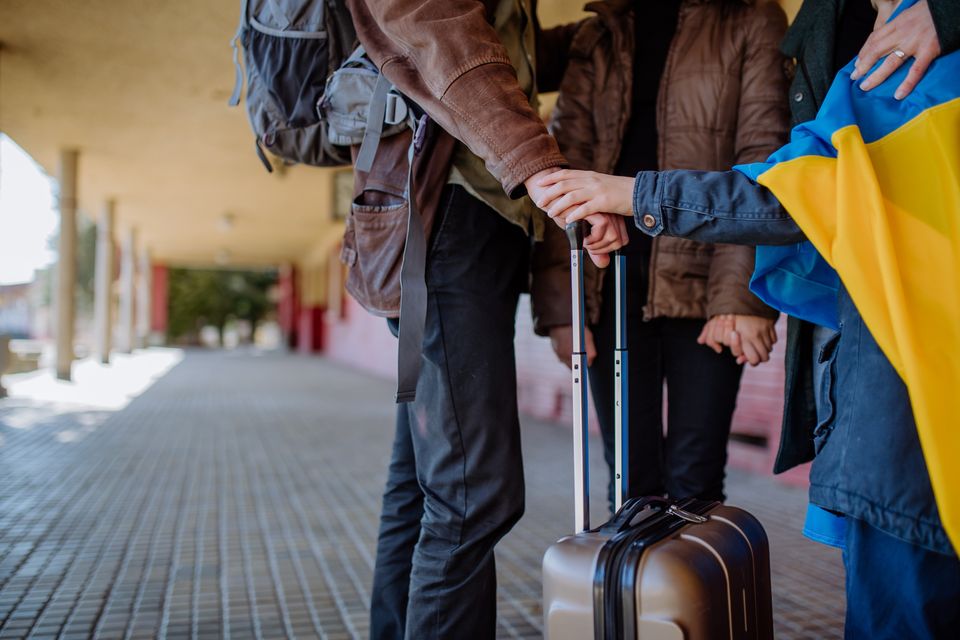Over 30,000 Ukrainian refugees could get full-time residency
Tens of thousands more could be paid social welfare on returning home
Granting residency could put further strain on the State’s already creaking system for accommodating refugees. Photo: Getty — © Getty Images
MORE than 30,000 Ukrainians could be granted permanent residency in Ireland if they are in secure jobs or education, while tens of thousands more could be paid welfare in order to return home, under plans being explored by the Government.
Ministers have been warned, however, that granting residency to some Ukrainians who are employed in Ireland may result in them being joined by family members – potentially putting further strain on the State’s already creaking system for accommodating refugees.
Draft proposals for the future of the estimated 75,000 Ukrainians in Ireland were discussed at a cabinet committee meeting earlier this month.
Ministers were given survey data from Ukrainian Action in Ireland, showing that 41pc – or just over 30,000 of refugees currently benefiting from the temporary protection – have decided to stay.
On This Day In History - 19th May
Around 24pc, or some 18,000, intend to return home, while nearly a third, or about 24,000, are unsure of their plans.
The granting of residency to Ukrainians who are in “durable employment or education” while encouraging “voluntary returns, including through the potential continued provision of supports for a certain time-bound period to provide security to those returning” were outlined as options to be explored further in a briefing paper.
However, any decisions will hinge on whether the EU decides to extend the temporary protection directive. Extending the directive, which affords Ukrainians the right to accommodation, employment, welfare and education in Ireland and across the EU, until March 2025 is considered a “real possibility”, according to the briefing document for ministers seen by the Irish Independent.
Ministers were told of a desire at an EU level for a “coherent and harmonised” approach to exiting the directive in order to avoid unintended consequences.
The paper outlines policy options to be examined and explored in more detail – including whether residency permission could be granted to certain cohorts of refugees such as those in “durable employment or education and the conditions of same”.
Another option to be explored is how to “incentivise voluntary returns, including through the potential continued provision of support for a certain time-bound period to provide security to those returning”.
Consideration would also have to be given to what conditions should be satisfied in order for residency to be granted to those who cannot return to Ukraine for health or humanitarian reasons or for families with schoolchildren. An approach to how the State would deal with unaccompanied minors who have arrived in Ireland from Ukraine would also have to be explored.
Ministers were told policies in this area “may have potentially substantial resource and cost implications, and will require significant collaboration across government”.
The paper says that it would be necessary to consider how this may impact on the international protection (IP) system in cases where Ukrainians do not avail of voluntary returns, are not in employment or do not qualify to remain here.
Amid unprecedented pressure on the IP system, Taoiseach Leo Varadkar has said Ireland could soon be aligned with the rest of the EU so thatthere is no “pull factor” to attract migrants seeking international protection to this country.
“What we’re trying to do when it comes to the kind of support and offering that we have [in Ireland] is to align them with other European countries so that they’re roughly the same,” Mr Varadkar said on Wednesday.
Separately, the Government and gardaí have agreed to prioritise sourcing of accommodation for asylum-seekers who are being forced to sleep on the streets. Justice Minister Simon Harris and Equality Minister Roderic O’Gorman met with Garda Commissioner Drew Harris, Deputy Commissioner Anne Marie McMahon, and Angela Willis, Assistant Commissioner for the Dublin Metropolitan Region yesterday.
A spokesperson for Mr Harris said after the meeting: “The ministers and Commissioner agreed that finding accommodation for currently unaccommodated international protection applicants is an absolute priority for the safety of the individuals involved.”
Join the Irish Independent WhatsApp channel
Stay up to date with all the latest news














